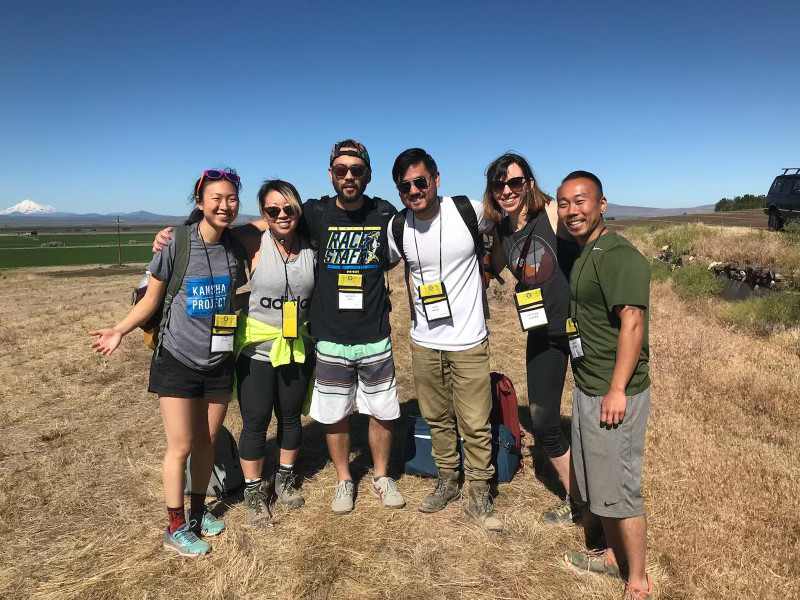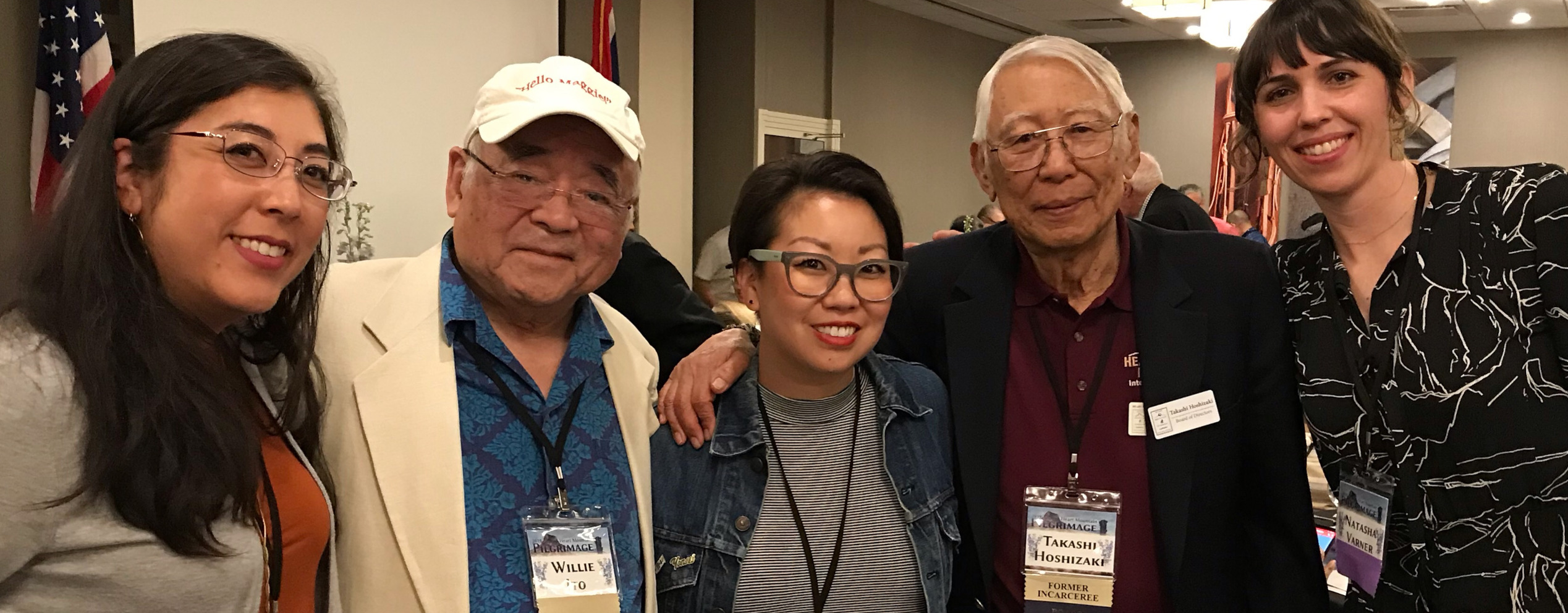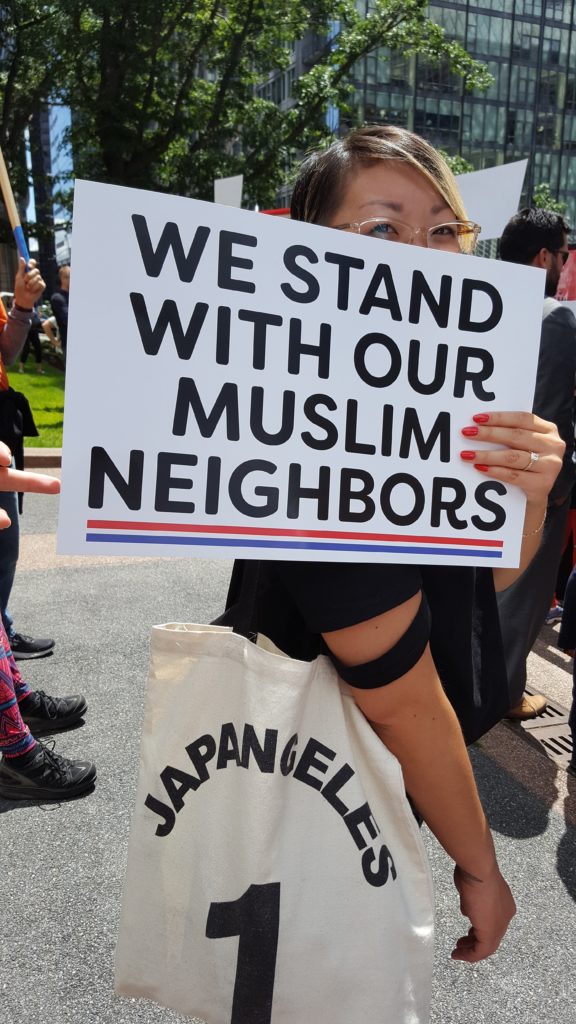May 10, 2022
We’re sharing the bittersweet news that Densho Fund Development Manager Danielle Higa is taking on a new role as a Senior Associate at the Nonprofit Professionals Advisory Group. While we’re sad to see her go, we’re excited for Danielle and grateful for her amazing work at Densho over the past five years. Danielle sat down with Densho’s Media & Outreach Manager Nina Wallace to share some of her favorite Densho memories, the lessons she’s taking away, and what she’s looking forward to in her next chapter.
Please join us in wishing Danielle our very best — and don’t worry, she’ll still be part of the Densho community, so this isn’t goodbye!
NW: Danielle, you’ve built so many relationships within the org and within the community in your time at Densho, and I thought a good starting place would be just how you came to be involved in Densho in the first place.
DH: My parents were actually on the board of the JACC [Japanese American Chamber of Commerce], so they would help with the golf tournaments and raising money for Densho, and then they would make me put together auction items and other tasks. This was probably like ‘98, middle school, almost high school, so I was like, “I don’t want to do this!” But I got introduced that way, and then in my freshman year of college, my first fall quarter was Asian American Studies 101 with Gail Nomura. We had to do an oral history and we used the really early version of the Densho website where you had to use a login and create a password. So I interviewed my grandma about camp, and then I used the Densho website for all of my Asian American Studies classes after that, but also for my own family research.
Before I came to Densho I was working at the University of Washington, and so many donors I spoke with [who were Japanese American or knew descendants] would ask me about camp, especially SoCal people. “Oh, you’re Japanese American. Are you yonsei?” They’d be like, “My family was at this camp, where was yours?” So I thought, is this a sign? Should I go back to the community?
NW: What’s one of your favorite Densho memories?
DH: The DOR event with Khizr Khan and Kishi Bashi was a favorite memory. That was amazing. I also really like being able to see how Densho has impacted the community on all levels, just by interacting with people and learning about their own connection to the history. I think that’s probably the most meaningful thing to experience while working here. Going to pilgrimages at Tule Lake and Heart Mountain those first two summers [I was at Densho], it was just amazing to hear people come up to us and say, “I’m so grateful for what Densho is doing because now my grandkids can hear the story. Now I can connect this history to the younger generation in my family.”

It’s interesting to see perspectives change when people age and how they look back. When you’re young, you don’t really pay much attention — or I didn’t pay much attention to that until college. It was like, gosh, this is such a huge, important piece of my family’s history. Nobody wants to talk about it because it’s painful, but I’m going to bring it up with my grandma. I think that helped her open up a little bit more about camp. So making those personal connections at events and seeing how Densho can impact a whole generation or more of families was a big part of what energized me and my work.
NW: You know, I didn’t have this on my little list of questions I wanted to ask you, but in hearing you talk about this, I’m curious — you’re a new mom, so the way we pass down this history or just the work that Densho does, do you think about that a little bit differently now?
DH: Oh, 100 percent. It’s important for [my husband] Francis and I to expose Nami to her Filipino side and her Japanese side. And I worry because a lot of the elders in the family, both families, have passed on and I just worry about doing a good job with that. So that’s why I’m like, “Oh, thank goodness Densho is there and the archive is growing!” I think, just from a busy mom perspective, there’s so much information out there and you don’t know if it’s going to be good or how it’s going to change later. So when she’s, you know, 10 or a tween, what will Densho look like? And I have a lot of confidence in the future of Densho and the archives. So I’m excited to see what she’ll learn from it. I hope as she ages and the pandemic passes there’ll be more in-person events to bring her to and she can interact with other goseis and meet other people who are connected to the history too.
NW: You’ve already spoken to this a little bit, but what’s something that you’ve learned working at Densho, about the history or about yourself?
DH: Every day I was constantly learning about things, because the history is so complex. Things I didn’t even think about like, especially now as a new mom or as a woman, how life would have been in camp. I think that’s Densho’s strong suit, being able to uncover all of that and kind of look into the lives of the people who were there. Like when [Densho Archives Director] Caitlin found those pharmacy records and I was like, yeah, what would we have done if we needed birth control? And sake is totally medicinal, so it’s crazy that a cultural spirit would be contraband, right? But also, like [Densho Content Director] Brian’s article about the latrines and looking at LGBTQ issues from our community back then… there’s a lot of things that Densho uncovered for me that I think really brought the full picture. For me, it’s just learning about the importance of passing on these stories, as someone who was the younger generation but is no longer the younger generation. [Laughs]
Densho also taught me to be unafraid to voice my views and my values. Just being louder about issues in our communities and joining others who are activists and feeling like I can support and be a part of that.
NW: That’s a big thing! It feels so intimidating to step into that, but if you’re kind of following someone else’s example, it’s like, “Yeah, I can do this. What they said!”
DH: Yeah, exactly. I think it’s hard because growing up, it was always like, “Don’t make waves,” and, you know, “The nail that sticks out gets hammered down.” Now I know that my voice is important, and so I’m going to be loud and join others who feel the same way. So it was nice to have that social justice aspect in the organization, and feel that it was supported on all levels. I feel empowered as a yonsei and a mom to stand up for what’s right because of everyone at Densho.
NW: What do you feel like you’re taking away from your time at Densho?
DH: I’m taking away a lot of amazing relationships. Densho was a place where I felt like I belonged for the first time after working in many places that were heavily political and complicated and large. But also, I felt such an emotional attachment to the work, so a lot of times it didn’t feel like work. I felt a great amount of responsibility to work at Densho to stay connected to my own family history and to make sure that the programs and relationships continue on for the future. So I guess I’m taking away a huge love for the community and a commitment to continue to stay involved too.
NW: It’s not a goodbye.
DH: Oh yeah, I’ll still be around!
NW: What are you looking forward to in your next chapter?
DH: Learning something completely different is really scary, but that’s also the exciting part because I’ll get to meet people around the country and learn how to help other organizations find great, talented people who want to serve their mission. It’ll just be nice to learn about other mission based orgs and what they’re doing in their communities. That’s so meaningful.
NW: Well, I know I feel really lucky being able to work with you and learn from you over the past five years. I’m going to miss all our little chats at the snack table and walking down to ChuMinh for lunch, but I’m so excited for you and I know you’ll be amazing in this new role.
—
[Header: Danielle with fellow Densho staff members and attendees of the Heart Mountain pilgrimage in 2019. From left to right: Caitlin Oiye Coon, Willie Ito, Danielle Higa, Takashi Hoshizaki, Natasha Varner.]

